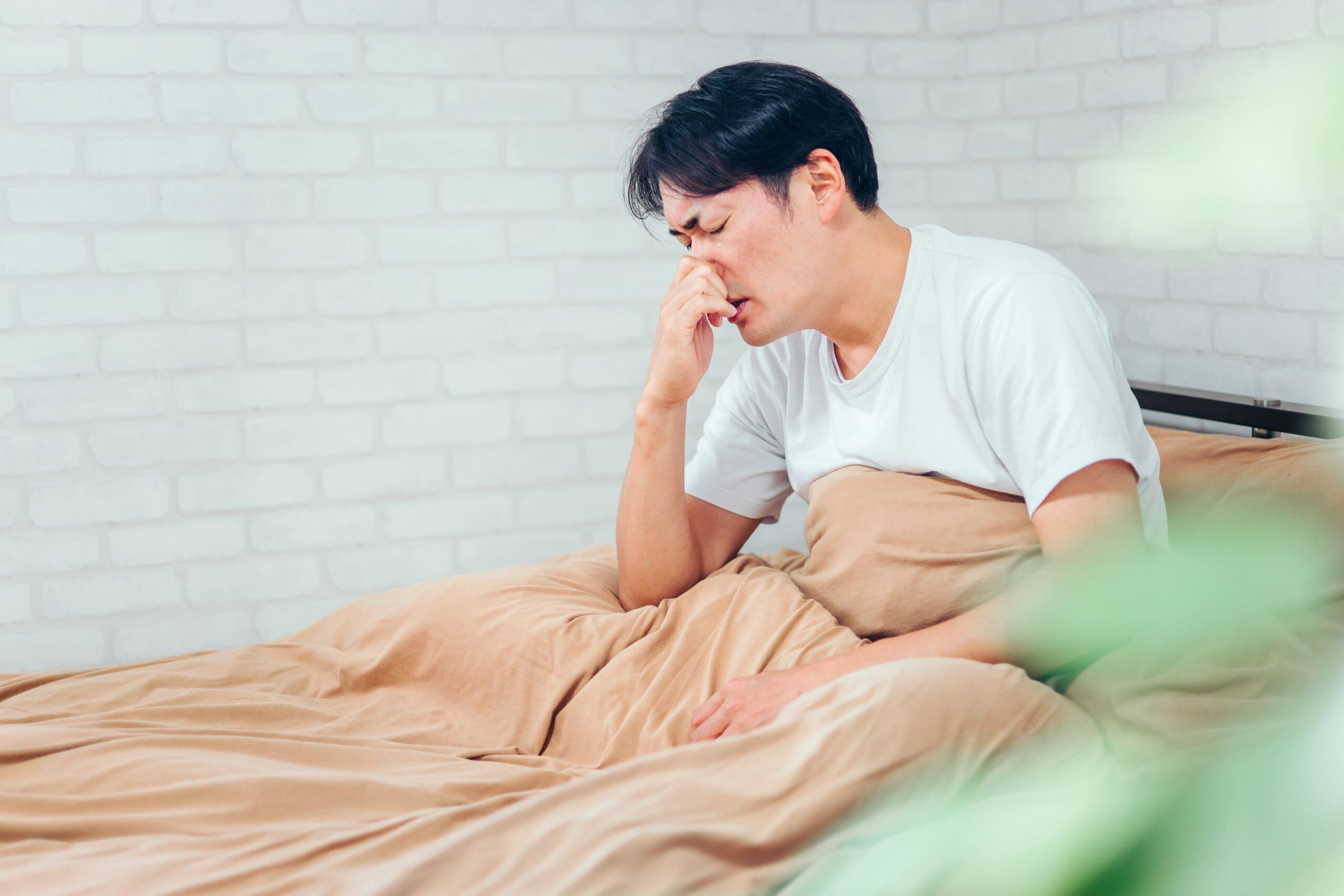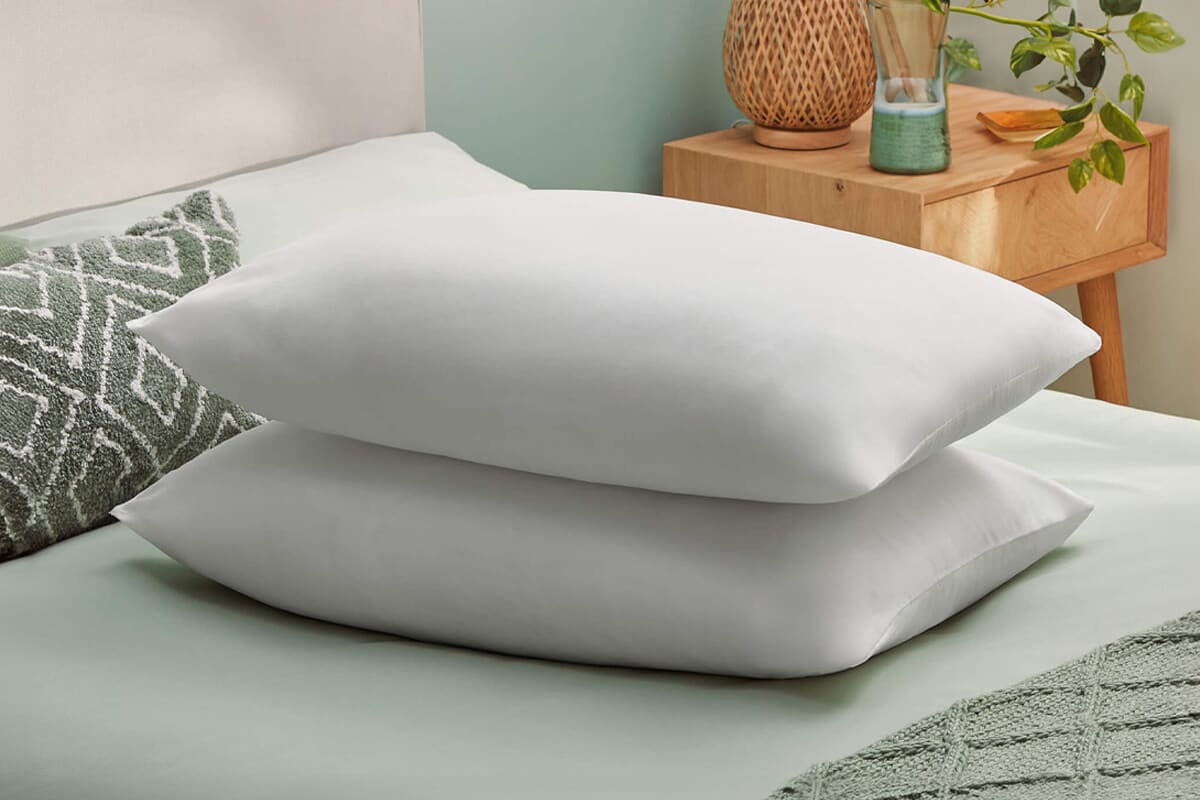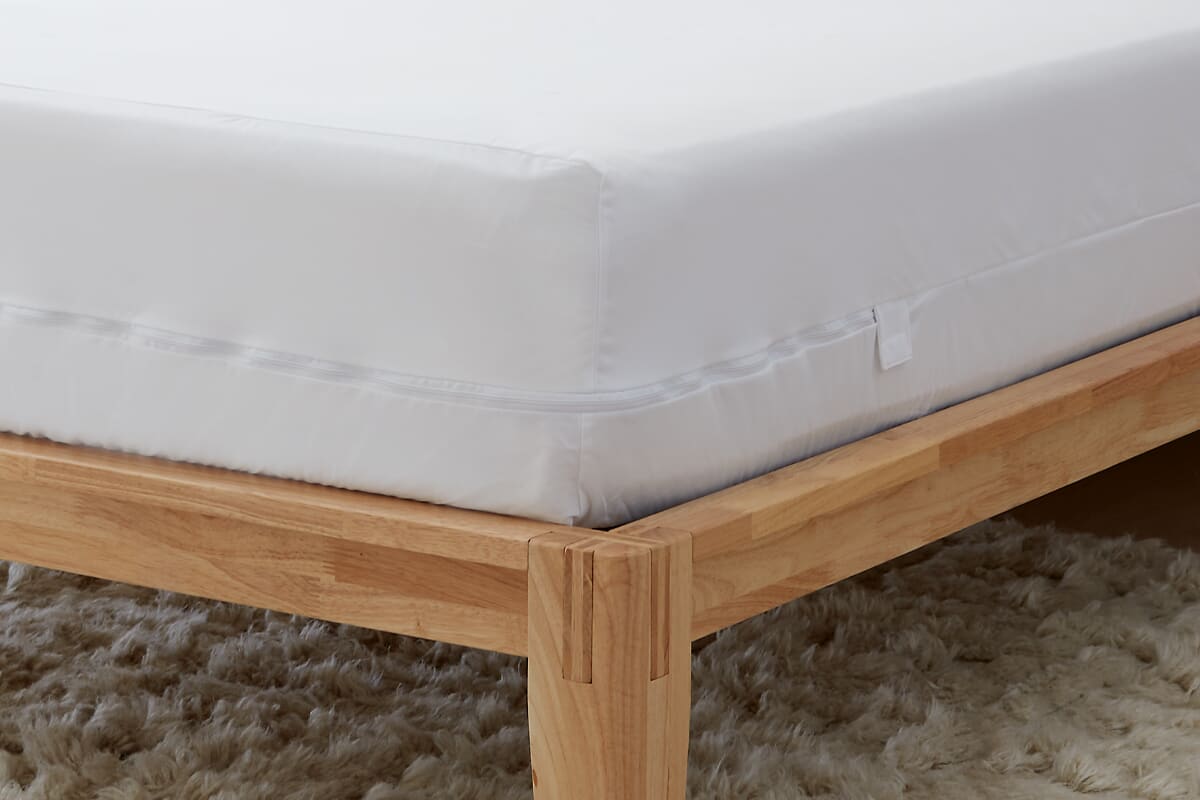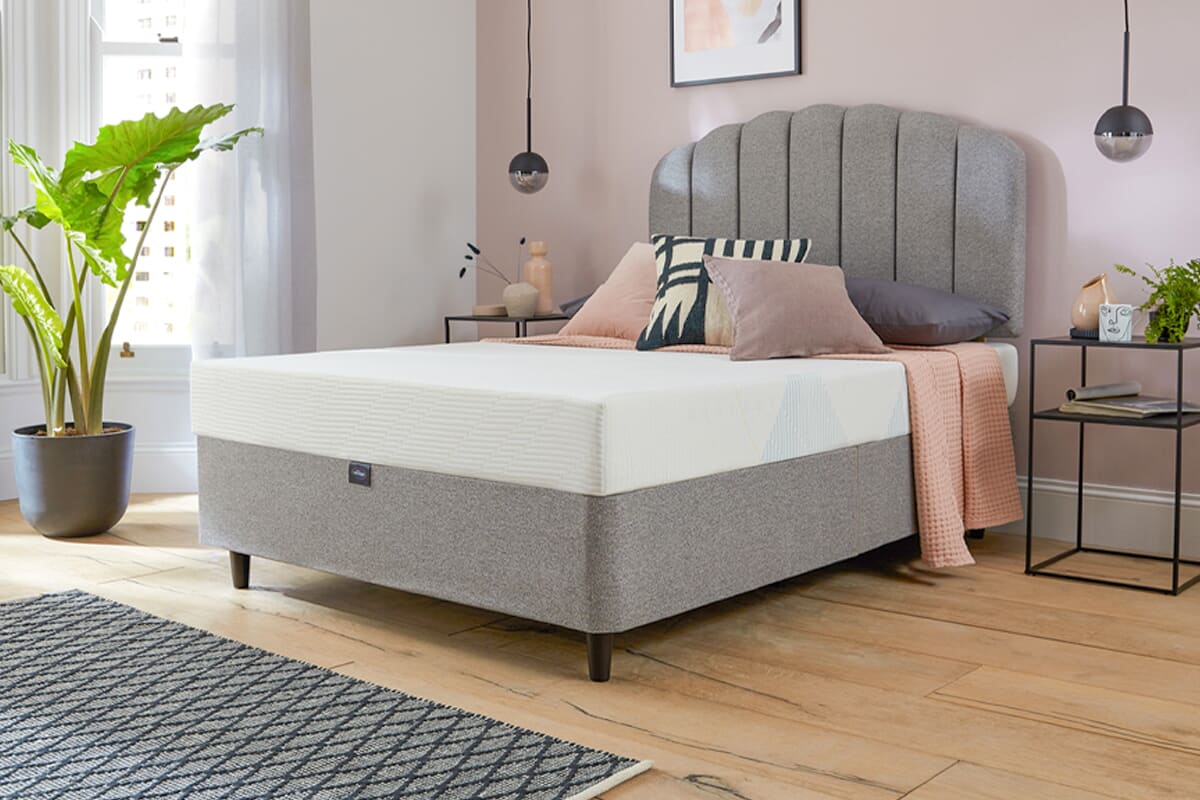Last updated: May 2025
Best Mattresses For Allergy Sufferers
Discover what makes a mattress good for allergy sufferers plus our top picks.
With a whopping 44% of British adults suffering from at least one allergy, it's no surprise that so many of us struggle to get to sleep. Tiny particles such as dust, mould, and pollen can trigger an allergic reaction during the night, and while there are steps you can take to sleep better with allergies, it's imperative that your sleep set-up is optimised for a fresher, healthier night's rest.
Thankfully, there are certain mattress types that are best for allergy sufferers, helping to prevent the build-up of bacteria and promoting a cleaner sleeping environment. Discover everything you need to know about hypoallergenic mattresses in our helpful guide.

What is a hypoallergenic mattress?
If you suffer from certain conditions that are triggered by allergens, such as eczema and psoriasis, you'll know how difficult dust particles and allergens can make it to have a proper night's sleep. Plus, if you're trying to sleep with asthma, the last thing you need is particles causing breathing problems and coughing in the night.
To help prevent your allergies from keeping you awake all night, a hypoallergenic mattress is specifically designed to create a cleaner and allergen-free environment through the use of both naturally hypoallergenic fibres and man-made anti-allergen coatings. These specialist mattresses prevent the build-up of dirt and dust, ensuring your sleeping area stays as clean as possible at all times.
Is a hypoallergenic mattress the same as an anti-allergy mattress?
The phrases 'hypoallergenic' and 'anti-allergy' are often used together to mean the same thing, however, they are not one in the same. Hypoallergenic refers to bedding or mattresses made from material that purely resists allergens.
They’re often made from natural materials that have inbuilt hypoallergenic properties. This can include wool, bamboo, silk and cotton. Because they’re natural, they’re kinder to your skin. They’re also incredibly effective at preventing allergens like dust mites, mould and bacteria.
Anti-allergy mattresses and bedding are chemically treated to stop allergens and eradicate them on contact. The chemicals used have been tested to a very high standard and are perfectly safe – unless you’re a dust mite, that is!
How does an anti-allergy mattress work?
Anti-allergy mattresses and bedding feature a special treatment that is able to both prevent the build-up of bacteria and unwanted critters such as dust mites and bed bugs, and when they do come into contact with them, elimante them on the spot.
The perfectly safe treatments, such as Jay-Be's Purotex®, can also help to absorb excess moisture to prevent bacteria being attracted to your (or your child's) bed.
What are the benefits of anti-allergy mattresses?
Anti-allergy mattresses aren't just the best for people with allergies, they're also a good choice for anyone that wants to keep their sleep environment cleaner. They can prevent an excess build-up of unwanted bacteria and dead skin cells in your bed, which creates the perfect feeding environment for bed bugs and other critters. This is why it's important to keep your mattress clean!
Anti-allergy mattresses are some of the best mattresses for children, as they're more prone to nighttime sniffles than adults. Children tend to breathe faster than adults, meaning throughout the course of the night they'll be breathing in more dust and allergens. Using an anti-allergy mattress is a great way to ensure they're sleeping in a clean, dust-resistant space.
What are the benefits of hypoallergenic mattresses?
You'll likely find that hypoallergenic mattresses are much more common and generally less expensive that anti-allergy mattresses. This is because they're usually naturally hypoallergenic due to the types of materials used, instead of needing additional treatments.
The surface of hypoallergenic mattresses prevents dust mites from being able to penetrate into the mattress itself. Dust mites in your home can lead to a considerably difficult night's sleep and if you're prone to allergies, it's worth investing in a mattress that keeps you safe from these pesky particles.



Do mattresses make allergies worse?
Some mattresses can make allergies worse by clinging onto bacteria, moisture, and mildew without you realising. If you don't clean your mattress regularly or look out for signs of allergens, you could be triggering your allergic reactions throughout the night.
You should also consider whether you're allergic to your mattress fillings, such as mohair or horsehair, which are common allergies.
What type of mattress is best for allergies?
Foam mattresses tend to be the most popular for allergy sufferers as they don't feature springs, which is where dust mites and bed bugs can make a home. Instead, the tight, high-density structure of a foam mattress makes it difficult for allergens to penetrate and take up residence, which is just one reason to consider a mattress without springs.
- Memory foam: The complex structure of a memory foam mattress makes it difficult for any allergens to get established inside the mattress filling. These advanced mattresses come in a full range of sizes from singles to super king and provide good levels of support.
- Latex foam: Like memory foam, latex foam is excellent at repelling allergens, thanks to the structure and the natural anti-allergen properties of latex. Slightly firmer than memory foam, it's also one of the more durable mattress styles. With proper care, this hypoallergenic mattress can last for many years.
- Reflex foam: Reflex foam mattresses also tend to be firmer and more dense than memory foam, offering orthopaedic support as well as hypoallergenic properties. They're naturally hypoallegenic and tend to be cheaper than other foam mattress types.
Do hypoallergenic mattress protectors work?
If you don't want to invest in a whole new mattress, consider hypoallergenic or anti-allergy bedding instead. A mattress protector is always a good idea to ensure a cleaner sleeping environment, but a hypoallergenic mattress protector can create a physical barrier between you and any allergens that might have snuck into your mattress.
Anti-allergy pillows are also an excellent choice for allergy sufferers, as this is the part of your bed that's in the closest vicinity to your airways. If you are prone to allergies, it's a good idea to make sure there's as little dust or bacteria buildup on your pillow as possible.
The best sleep products for allergy sufferers
There are hundreds of hypoallergenic mattresses and anti-allergy bedding accessories out there, so it's understandable that it's tricky to choose the best ones. We've picked our favourite products for making your sleep set-up as allergen-free and fresh as possible:
Silentnight Anti Allergy Pillow Twin Pack
Anti-bacterial and approved by the British Allergy Foundation, this twin pack of anti-allergy pillows is ideal for creating a clean sleeping environment. Perfect for those with sensitive skin, the fibres within the pillows have been scientifically tested and proven to reduce or remove allergens from your bed. You can also machine wash these pillows and their removable covers for complete convenience.

Purecare® Omniguard 6-sided Advanced Mattress Protector
This 6-sided mattress protector zips around your mattress to completely encase it. With specialist silver chloride treatment, bed bugs, dust mites, moisture, and other allergens are unable to penetrate the cover, keeping your mattress safe. Breathable and lightweight, this vegan-friendly mattress protector does not change the comfort of your mattress, and is conveniently machine washable.

Silentnight 3 Zone Memory Foam Mattress
The structure of this memory foam mattress makes it incredibly difficult for allergens, dust, and bacteria to penetrate. With an Allergy UK Seal of Approval, this Silentnight mattress is naturally hypoallergenic and features a durable knitted casing for extra protection. Available with a 100 night trial, you can try this mattress out for yourself to see if it works for your nighttime allergies.

Get a better night's sleep with MattressNextDay
Now you have a better understanding of the difference between anti-allergy and hypoallergenic mattresses and which are the best, you can begin to make your sleep set-up as fresh and hygienic as possible. Discover more tips for keeping your home and bedroom clean, such as letting your bed air out in the morning before making it, in our Snooze News sleep blog.
And for more helpful guides like this one, take a look at our selection of buying guides to help you find your perfect mattress. If your allergies have taken a hold before you get a chance to change your mattress, read our guide on how to sleep with a blocked nose.

